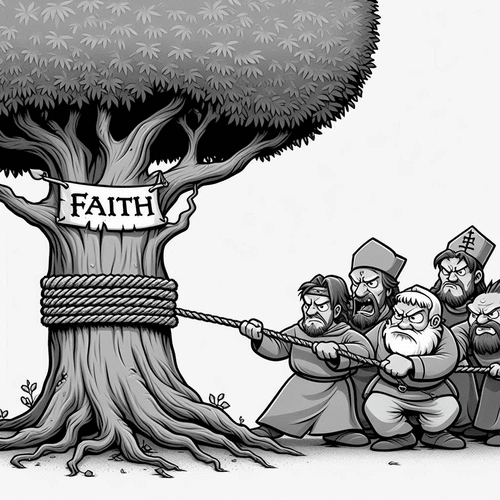Do Altar Calls Help or Hurt Evangelism?
THE REFORMED CASE FOR AND AGAINST ALTAR CALLS
Evangelist DL Moody once faced a sharp critic of his evangelistic methods. The lady challenged his approach to calling people forward, questioning whether such tactics were appropriate. Moody listened patiently, then asked, “I agree with you. I don’t like the way I do it either. Tell me, how do you do it?” When she sheepishly admitted, “I don’t do it,” Moody delivered his famous retort: “Then I like my way of doing it better than your way of not doing it.”
This exchange captures something essential about the Reformed approach to altar calls. We’re less interested in defending methods than in advancing the gospel. The question isn’t whether altar calls are inherently good or bad, but whether they serve or obscure the message of salvation by grace alone through faith alone in Christ alone.
DO ALTAR CALLS HELP OR HURT? THE REFORMED ANSWER: IT DEPENDS
Method Serves Message, Not Vice Versa: Reformed theology has always distinguished between the unchanging gospel message and the variable methods of presenting it. Calvin never prescribed specific evangelistic techniques in his Institutes. The Westminster Confession focuses on the faithful proclamation of the Word, not particular altar arrangements. This isn’t indifference to method—it’s theological wisdom.
The non-negotiables are clear: salvation comes through God’s sovereign grace, received by faith alone in Christ alone. Everything else—including how we structure response to gospel preaching—must be evaluated by one crucial test: does the method serve the gospel or obscure it?
This framework frees us from both slavish traditionalism (“we’ve always done it this way”) and reactive modernism (“that’s old-fashioned, so it must be wrong”). Instead, we ask practical questions rooted in theological conviction: Does this approach clarify or confuse the gospel? Does it honour God’s sovereignty when we call for a genuine human response?
LEARNING FROM CHRIST’S OWN APPROACH
Before evaluating modern methods, we shall do well to examine how Jesus Himself handled responses to His message. Remarkably, His approach varied dramatically based on His audience and their readiness.
Sometimes Jesus did emphasise urgency. When the rich young ruler walked away sad, Jesus didn’t chase after him with softer terms or emotional appeals. But when Zacchaeus responded with immediate repentance, Jesus celebrated the swift transformation. At other times, Jesus called people to immediate, costly action: “Follow me, and let the dead bury their own dead.”
Yet in Luke 14:25-33, Jesus demonstrates a strikingly different approach. Facing large crowds eager to follow him, he essentially gave an “altar call” in reverse. Instead of making discipleship easier, he made it harder. He insisted they count the cost carefully before committing, examining whether they loved him above all personal relationships (v. 26), above all personal ambitions (v. 27), and above all personal possessions (v. 33). His reasoning? Without such careful consideration, they’d quickly desert Him when trials came.
This biblical pattern reveals profound pastoral wisdom. Some situations call for pressing urgency—the gospel demands and deserves an immediate response. Others require careful reflection and cost-counting to prevent false professions that damage both the individual and the church’s testimony. Jesus never used manipulative techniques, but He did adapt His approach to serve authentic conversion rather than mere crowd excitement.
WHEN ALTAR CALLS SERVE THE GOSPEL
Properly conducted altar calls can powerfully serve gospel proclamation.
First, they provide clarity and urgency in decision-making. When a preacher explains that following Christ requires personal faith and then offers a concrete way to express that decision, seekers understand what response the gospel demands. This removes dangerous ambiguity and creates pastoral opportunities for immediate follow-up and instruction.
Second, public response has biblical precedent. Acts 2 records three thousand people publicly responding to Peter’s preaching through baptism. Jesus called his disciples openly: “Follow me.” The Reformed tradition has always affirmed public profession of faith as normative Christian practice.
Third, well-handled invitations do demonstrate pastoral wisdom. They create teachable moments for explaining the difference between justification and sanctification—that walking forward doesn’t save you, but Christ does. They allow immediate correction when someone confuses the physical act with spiritual reality. Most importantly, they facilitate connection with the local church community where new believers can be discipled.
The key caveat? Our invitation must clearly distinguish between the human response and God’s sovereign work in salvation. The evangelist who says, “God has already chosen those who will respond tonight” while extending a biblical invitation understands this balance.
WHEN ALTAR CALLS OBSCURE THE GOSPEL
However, altar calls can become gospel hindrances too:
When we prioritise manipulation over proclamation: Emotional pressure tactics that bypass the mind, artificial deadlines that rush decisions, and psychological techniques that create false conversions all betray the gospel’s power. When the focus shifts from God’s gracious work to human decision-making, we’ve lost the plot entirely.
When we prioritise blind compliance over weighing the costs: Theological confusion multiplies when altar calls suggest salvation depends on physical acts rather than heart faith. Some approaches create dangerous “two-tier” Christianity, implying those who “went forward” are somehow more genuinely converted than others. This confuses justification—God’s work of declaring sinners righteous—with public profession, which is merely the human response to that divine work.
The practical problems are equally serious: Rushed professions without understanding, false assurance based on past “altar experiences” rather than present faith, and manipulative traditions that replace Spirit-led response with emotional coercion all hinder genuine evangelism. Charles Spurgeon, beloved by Reformed believers, used invitations but warned against trusting in any method as essential to conversion.
Perhaps most dangerously, poorly handled altar calls can diminish Word ministry itself. When the “invitation” becomes more important than the sermon, when preaching gets shaped by the desire for immediate “results” rather than faithful exposition, and when the rich biblical gospel gets reduced to simple formulas, we’ve traded our birthright for a mess of statistical pottage.
OUR CONSIDERED ANSWER: “IT DEPENDS”
So, do altar calls help or hurt? What’s the Reformed verdict? Like most pastoral questions, it depends on our faithfulness to guiding principles.
- Maintain the primacy of the Word. Any evangelistic method must serve clear gospel proclamation, never replace it.
- Exercise pastoral sensitivity by considering your context, your congregation’s maturity, and relevant cultural factors.
- Preserve doctrinal clarity by always distinguishing between God’s saving work and human professions by way of response.
- Evaluate methods by their fruit—long-term discipleship, not immediate “decisions.”
Some contexts genuinely benefit from structured response opportunities. Others are better served by ongoing pastoral counselling and private conversations. The key isn’t allegiance to particular methods but faithfulness to Scripture and the gospel it proclaims.
Like Moody, Reformed churches should spend less energy criticising evangelistic methods and more effort ensuring we’re actually doing evangelism. The gospel advances through faithful proclamation accompanied by biblical methods that serve the message rather than obscure it.
Whether we use altar calls or not, the crucial question remains: Are we clearly presenting Christ crucified and risen, and calling sinners to repentance and faith? That’s the invitation that truly matters.
DO ALTAR CALLS HELP OR HURT? RELATED FAQs
How did John Calvin handle public response? Calvin emphasised public profession through catechetical instruction and formal church membership processes. In Geneva, he required extensive doctrinal examination before communion participation, effectively creating a “delayed response” system. Calvin believed hasty professions without understanding harmed both the individual and the church’s purity, preferring thorough preparation over an immediate emotional response.
- How did Reformed revivalists like George Whitefield handle invitations? Whitefield preached to massive crowds but rarely used formal altar calls. Instead, he relied on personal counselling and correspondence afterward. He established “inquiry meetings” where seekers could receive individual instruction rather than making public decisions. Jonathan Edwards, likewise, focused on private examination of conversion experiences, believing genuine revival produced fruit over time rather than immediate visible responses.
- What’s the difference between Arminian and Reformed approaches to altar calls? Arminian theology sees altar calls as opportunities for us to “choose” salvation through free will, making the response central to conversion. Reformed theology views any invitation as simply providing opportunity for those already regenerated by the Spirit to publicly profess existing faith. This theological difference dramatically affects how invitations are given—Arminians emphasise human decision-making, while Reformed preachers emphasise God’s prior work in the heart.
- How do Reformed churches typically handle child conversions without altar calls? Most Reformed churches use age-appropriate catechism classes, family discipleship, and pastoral counselling rather than public invitations for children. They recognise that young people raised in Christian homes often experience gradual awakening rather than dramatic conversion moments. The Westminster Shorter Catechism approach allows children to grow into faith understanding before making public profession, preventing premature or coerced decisions.
- What did Charles Spurgeon actually say about his invitation methods? Spurgeon used “inquiry rooms” after services but warned against making any method essential to salvation: “Conversion is the miracle of a moment, but the manufacture of a convert is the work of a lifetime.” He criticised American revivalist techniques as potentially manipulative while maintaining genuine seekers needed pastoral guidance. Spurgeon’s approach emphasised clear gospel preaching, followed by careful personal counselling rather than immediate public response.
How do Reformed churches evaluate contemporary altar call practices? Reformed churches typically ask four diagnostic questions: Does the invitation 1) Clearly distinguish between God’s saving work and human response? 2) Avoid emotional manipulation while still calling for genuine repentance and faith? 3) Lead to long-term discipleship rather than just statistical decisions? 4) Honour both divine sovereignty and human responsibility in conversion? Methods that pass these tests tend to serve the gospel regardless of their historical pedigree or contemporary popularity.
DO ALTAR CALLS HELP OR HURT? OUR RELATED POSTS
Editor's Pick

Why Do People Hate the Doctrine of Election?
…WHEN THEY REALLY SHOULDN’T Few Bible doctrines provoke stronger reactions than election. The idea that God chose some for salvation [...]

The Doctrine of Providence: Does God Really Govern All Things?
You’re sitting in the doctor’s office when the diagnosis lands like a thunderclap. Your mind races: Why this? Why now? [...]

No Decay, No Defeat: What It Means That Christ’s Body Saw No Corruption
On the Day of Pentecost, Peter stood before thousands and made a startling claim: David's body decayed in the tomb, [...]
SUPPORT US:
Feel the Holy Spirit's gentle nudge to partner with us?
Donate Online:
Account Name: TRUTHS TO DIE FOR FOUNDATION
Account Number: 10243565459
Bank IFSC: IDFB0043391
Bank Name: IDFC FIRST BANK






